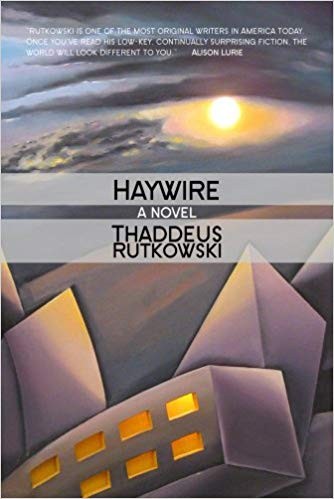Review of Thaddeus Rutkowski's reissued flash fiction novel: Haywire
By Gila Green
About seven years ago, I was asked to write a paid blog post about a twitter novel and Twitterature in general that was sure to come and stampede over the novel structure most of us are familiar with. While I recall thinking how much I liked the idea of challenging the current novel format, (not to discard it but to offer alternative modes and new diving boards of inspiration) I wrote the article with no genuine anticipation.
In my heart the advent of the "cell phone novel" didn't move me. I wasn't on edge waiting for the twitter novel best seller. Don't get me wrong. There are no sparks for me, but bring on experimentation for those who are motivated. Bravo to those interested in the intersectionality between technology and culture (pop or otherwise).
My real desire is to see flash fiction novels come into their own, an alternative to the short story collection and the novel-in-stories, both first and enduring loves of mine. The concept of a flash fiction novel is a welcome one for so many reasons, not least of all the fun and challenge of it. Mostly, I'm drawn to the idea of a solid narrative, crackling with brevity. But nobody offered to pay me to write a blog post about a flash fiction novel. So, seven years later, I'm writing my own.
My springboard is Thaddeus Rutkowski's new flash fiction novel, Haywire, a novel in 49 flash fictions and I found it highly entertaining. Haywire was originally published in 2011 by Starcherone Books, Buffalo and I'm sorry to say, I missed it at the time. It has now been reissued by Blue Streak Press, Brooklyn.
Rutkowski travels a chronological line in this novel from childhood to adolescence and "escape", and on to adulthood. It's divided into three parts and by part two the hero is a college freshman, finally free of his parents' home. By the end, he's a father, though still very much with one foot in his youth.
The novel stays true to the flash form; each story is about the same length, four or five pages. There are no jarring one-page chapters and Rutkowski does not veer into the long short story or prose poetry. This novel is all crisp flash fiction for flash lovers to gobble up. There's a lyrical balance to the entire read as far as form goes, but not pace, and I enjoyed part one the most. There was less intensity after that. It's possible to read this work in chunks, ideal for readers like myself, who don't always have wedges of reading time.
The dark sense of humor on display from the start that threads its way between the lines until the end appealed to me throughout.
It's only a few pages into the first flash when we read:
"We'll find wild food more often, and grow what we can't
find," my father said. "For protein, we'll hunt and fish. We'll be
self-sufficient—live like the Amish. We'll have no contact with
the outside world.
I looked around the kitchen and saw several electrical
appliances. I also saw a number of brand-name goods.
Yet, there is an undercurrent of loss and sadness between the pages tangled with the humor. Haywire is making a point about a particular time growing up in America in a casual way I would call vacant.
On the way, they sang school songs.
One was about the rival team; it went: "To hell, to hell with
Pennsylvania. To hell, to hell with Pennsylvania. To hell, to hell
with Pennsylvania. To hell with the U. of P.—pee you!"
There are a few blows of racism but nothing shrill:
Afterward, the director said to me, "You might do better
on South Pacific. There are Polynesians in it. Aren't you from
someplace like Bali Ha'i yourself?"
When he met me, my roommate said, "I heard your name
and thought you'd look like a football player. But you look more
like the cook on Bonanza, that guy named Hop Sing."
I decided to write a term paper about the divided self. I wanted to discuss the self versus the not-self, or the other.
If you're looking for blow-your-mind, poetic writing or serious reflection, this is not the book for you. This book is written with a light hand. Still, Haywire successfully manages to cover racism, child abuse, poverty, sexual addiction, and bisexuality without sentimentality and there's a message in there about forgiveness too.
I was inspired by Haywire and cheers to the author for putting out an understated novel in the long line of coming-of-age stories that leaves it up to the reader to bring its conclusions to light. No doubt I could let this first reading breathe, then read it again.
For an interview with Thaddeus Rutkowski on "The Short Review".
Bio: Thaddeus Rutkowski grew up in central Pennsylvania and is a graduate of Cornell University and The Johns Hopkins University. Nominated for the Pushcart Prize, Best Small Fictions, and Best American Short Stories, he is also the author of the novels Tetched (Behler Publications) and Roughhouse (Kaya Press), as well as the memoir Guess and Check (Gival Press) and the poetry collection Border Crossings (Sensitive Skin Books). Haywire won the Asian American Writers' Workshop's Members' Choice Literary Award.
When you subscribe to the blog, we will send you an e-mail when there are new updates on the site so you wouldn't miss them.


Comments